-
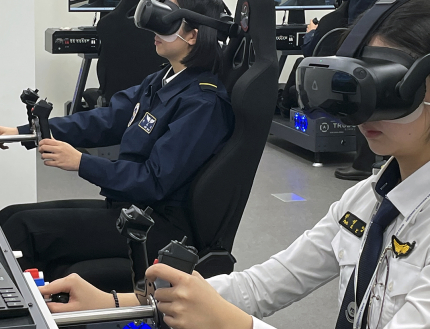
Korea’s First Flight Training Program Utilizing VR and AI Technology
The Flight Training Center has launched Korea’s first-ever university flight training program integrating virtual reality (VR) and artificial intelligence (AI). This groundbreaking initiative offers a new alternative to address weaknesses in Korea’s flight training environment. The program, titled ELITE (Enhanced Learning through Immersive Training Equipment), is designed for students in the Department of Aviation and Flight Operations. It provides an advanced flight training experience using a VR flight simulator specialized for the Cessna C-172S training aircraft, with AI-powered instructors guiding students through piloting techniques. Under the guidance of both university flight instructors and AI-based flight instructors, students will experience a fully immersive VR training environment. They will familiarize themselves with aircraft systems, perform pre-flight inspections, and learn piloting techniques in a setting that closely mimics real-world flight conditions. By completing the one-semester training course, students will also have the opportunity to obtain a VR-based private pilot certification. Han Sam-seung, head of the Flight Training Center’s Education Quality Management Team, emphasized the significance of the new program, saying, “VR-based flight training provides students with an experience comparable to real-life flying, enhancing their ability to adapt to flight conditions and reducing the time needed to reach solo flight proficiency. During the development of the ELITE program, our top priorities were to enhance educational efficiency by integrating it with academic coursework, improve air traffic control (ATC) skills, and increase flight safety through abnormal procedure training.” The ELITE program will continue to provide flight training to 100 students per year. The Flight Training Center also plans to expand its use of VR-based training equipment and conduct research on the program’s effectiveness to further refine and optimize flight education. Kim In-gyu, Director of the Flight Training Center, highlighted the transformative potential of VR technology in aviation education, stating, “As VR technology continues to advance, new training opportunities are emerging in the field of flight education. We at the Flight Training Center will remain at the forefront of integrating cutting-edge technology into training programs, fostering the development of world-class aviation professionals.”
2025-03-19 -
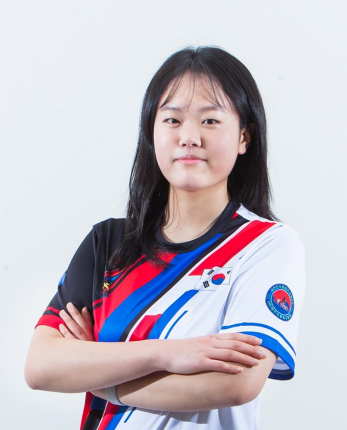
Smart Drone Engineering Student Seo-kyung Ji Selected for the National Drone Soccer Team
Seo-kyung Ji, a student of Korea Aerospace University’s Smart Drone Engineering Department, has overcome fierce competition and earned a spot on the National Drone Soccer Team. Due to the first-ever Drone Soccer World Cup set to take place this year, the selection process was rigorous, comprising an initial document screening followed by a second-round evaluation that included written tests, flight skills, interviews, and aircraft maintenance assessments. Those who made the cut will have the opportunity to compete in international tournaments. For the past year, Ji has dedicated herself to intensive training with the goal of making the national team. She never missed the team training sessions held every Tuesday and Thursday, and in the lead-up to competitions, she practiced flying every single day. She also pursued certifications as a drone soccer coach and referee to enhance her understanding of game operations. Her journey into drone soccer began at an aviation camp hosted by her university. Blocking opponents and e x e cuting plays that go beyond piloting the drones fascinated her to begin serious training. Currently, Ji trains at the DR One Center in Goyang City, actively competes in tournaments, and continues her efforts toward becoming a certified coach and referee. One of the biggest draws of drone soccer, according to Ji, is the ability to custom-build and modify your own aircraft for gameplay. The sport also involves distinct positional roles. Strikers are responsible for scoring goals, while guides clear a path through the defense. Defenders block the opposing team’s attacks. Ji shared that she finds great fulfillment in experiencing different positions and building strong teamwork with her fellow players. Her current goal is to deliver an outstanding performance at the inaugural Drone Soccer World Cup, set to take place from September 25 to 28, and to help elevate the status of Korean drone soccer on the global stage. She also hopes to raise awareness of drone soccer worldwide and encourage more people to take an interest in the sport. As advice to incoming university freshmen, Ji stressed the importance of embracing challenges and broadening one’s perspective. “A koi fish will only grow 5 to 10 cm in a small fish tank, but in the vast ocean, it can grow up to 1 m. Expand your environment yourself.” She stressed the value of setting goals and immersing oneself in them. She also encouraged students to take advantage of extracurricular activities such as clubs, student organizations, and competitions, encouraging them to use these opportunities to discover their interests. As Ji Seo-kyung prepares to take flight as a national drone soccer player, the entire university cheers for her successful launch.
2025-03-19 -
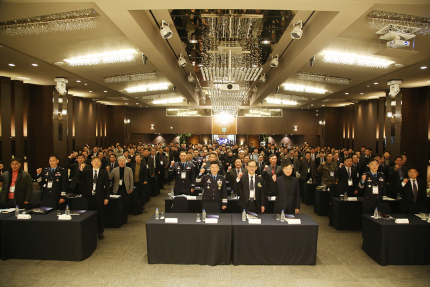
KAU Co-hosts the Korea Aerospace Forum with the ROK Air Force, Proposing Strategies to Strengthen National Space Power in Response to Expanding Space Forces of Neighboring Countries
Korean Aerospace University (KAU) and the Republic of Korea Air Force (ROKAF) co-hosted the Korea Aerospace Forum on Tue, Feb. 18 at the Air Force Hotel Convention Hall with immense success. It was organized to foster public–private partnership involving academia and the military in developing Korea’s space strategy, with Korean Air sponsoring the event. The forum was held under the theme of ‘Korean military forces’ reactions to the expansion of neighboring countries’ aerospace power and the private sector’s role.’ Those who attended the forum included officials from KAU, ROKAF, Korean Air, Korean Institute for Defense Industry (KOIDI), Hanwha Systems, Korea Aerospace Industries (KAI), and LIG Nex1. The participants reached a consensus that changes in South Korea’s surroundings, such as the Trump administration’s shifting international initiatives and the expansion of China’s and North Korea’s space capabilities, calling for Korea to re-navigate its space strategies. Based on this shared notion, they exchanged in-depth discussions on leveraging space assets—emerging as a ‘game changer’ in the recent Russo-Ukrainian War—to enhance Korea’s military aerospace power. ROKAF Chief of Staff General Lee Young-su and KAU President Hurr Hee-young delivered welcome remarks, highlighting the forum’s significance and expressing gratitude to attendees. General Lee stated, “Today’s forum provides a valuable opportunity to discuss collaboration between academia, industries, research institutions, and the military for aerospace advancement. By sharing and analyzing real-world cases of space power utilization in warfare, trends in neighboring countries’ space capabilities, and the latest space weapon developments, we can explore directions for strengthening national defense space power.” President Hurr responded, “KAU remains committed to supporting national security and Korea’s leap to rising as a powerhouse of space industries. We promise to serve as a hub for sharing its 73 years of aerospace education and research expertise with the private sector, government agencies, and the national military.” His speech was followed by congratulatory messages from the National Assembly National Defense Committee Chairman Sung Il-jong and the People Power Party’s Representative Yoo Young-won. They praised the forum, stating, “We live in an era of increased uncertainties in security. During these times, we praise bringing together the public, private, and military sectors to discuss Korea’s space strategy.” The two also expressed appreciation for KAU’s role in facilitating these connections. The opening keynote speech was delivered by KAU professor emeritus and former director of the Agency for Defense Development (ADD) Dr. Park Jong-seung. In his speech under the theme of ‘constructing space power as a security infrastructure,’ he stressed, “With neighboring countries advancing their space capabilities, it is now essential for Korea’s private and military sectors to formulate countermeasures and develop strategies for next-generation space weapon systems.” The first session, held after lunch, featured private business representatives’ presentations on securing future military space power from an industrial perspective. Hanwha Systems Space & Air Team Lead Gwon Tae-hoon presented ‘proposals for future military space weapon systems,’ introducing Hanwha’s aerospace business roadmap. Meanwhile, Korea Aerospace Industries (KAI) Team Lead Jeong Yeon-jae discussed ‘utilizing reusable space vehicles for the space warfare era,’ advocating for their integration into military weapon systems. LIG Nex1 Research Fellow Hwang Hong-yun followed up with ‘key technologies for space-based surveillance,’ outlining the core technologies required for space domain awareness systems. Lastly, Korean Air Team Lead Lee Yoon-pyo proposed plans for ‘securing future military space power through airborne launch vehicles,’ highlighting their potential for rapid deployment of space assets. The second session featured presentations by ROKAF and KAU. ROKAF Headquarters Space Center Colonel Jeong Hae-wook spoke on the ‘status and development strategies for space situational awareness,’ highlighting Korea’s need to enhance its space surveillance capabilities in response to ever-changing regional security dynamics. The session concluded with a presentation from KAU Space System Technology Research Center, led by Professor Oh Hyun-woong. The center’s faculty underscored the importance of new-space Earth observation satellites (NEONSAT), saying, “Developing and utilizing NEONSTATS are indispensable for us to enhance surveillance and reconnaissance of North Korea and advance the ‘Kill Chain’ capability of Korea’s 3K (Kill Chain platform, Korea Air and Missile Defense system, and Korea Massive Punishment and Retaliation plan) defense system.” He went on to propose strategies for utilizing small satellites to strengthen future military space capabilities. KAU Space System Technology Research Center was established in 2023 to consolidate the university’s space research and development efforts. Faculty members specializing in satellite and payload technologies collaborate to conduct research on satellite systems needed by both the government and industry. Center Professors Yoon Ji-jung and Choi Yoon-hyuk introduced global case studies on military applications of CubeSats. Meanwhile, Professor Oh Hyun-woong presented on ‘space domain awareness using CubeSats,’ discussing the use of commercial products like GoPro cameras for space surveillance. He stated, “To shift Korea’s defense space development from a reactive to a leading position, universities must take the initiative in pre-validating technologies and integrating their findings into national defense space programs, creating a virtuous cycle of innovation.” The forum welcomed over 200 attendees as they engaged in an open discussion on strategies to enhance Korea’s space power. Participants agreed that the event marked a significant turning point in public–private–military partnership and expressed anticipation for future discussions.
2025-02-24 -
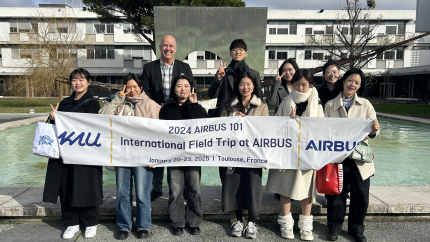
KAU–Airbus Korea Successfully Conclude 2024 Airbus 101 International Field Trip
Korea Aerospace University announced the successful conclusion of the jointly organized 2024 Airbus 101 International Field Trip program with Airbus Korea from Jan. 20 to 23, 2025. The program included a visit to Airbus headquarters in Toulouse, France as well as tours of ENAC (École nationale de l’aviation civile; National School of Civil Aviation, France) and ISAE-SUPAERO (Institut supérieur de l’aéronautique et de l’espace; Higher Institute of Aeronautics and Space), providing students with a valuable opportunity to experience the global aerospace industry firsthand. Visit to Airbus headquarters: experiencing the frontline of the aviation industry During the first two days of the field trip program, students visited Airbus headquarters, where they had the opportunity to explore aircraft manufacturing and research facilities firsthand. On Mon, Jan. 20, the top three teams from the 2024 Airbus 101 Idea Competition presented their ideas to Airbus e x e cutives, receiving feedback and discussing the feasibility and potential impact of their innovations on the aviation industry. In a subsequent lecture, students gained insights into Airbus’s commercial strategies and innovative technologies, learning about the latest trends in the aviation sector. The visit continued with a tour of the Airspace Customer Showroom, where students explored the interiors of Airbus’s flagship aircraft and experienced how cabin designs are tailored to customer needs. At the French aeronautical nuseum Aeroscopia, they viewed historic aircraft, including the iconic Concorde, gaining a comprehensive understanding of the evolution of the aviation industry. On Tue, Jan. 21, students visited the A350 Final Assembly Line (FAL), where they observed the aircraft manufacturing process up close. They learned about the advanced engineering and meticulous design strategies that enhance aircraft safety and efficiency. Seeing aircraft under construction, they witnessed firsthand how aviation is a result of cutting-edge engineering and precision technology rather than mere assembly. Visit to ENAC & ISAE-SUPAERO: building a global aerospace network From Wed, Jan. 22 to Thu, Jan. 23, students visited ENAC and ISAE-SUPAERO to gain firsthand insight into aerospace engineering education in France. As two of the world’s leading aerospace institutions, these universities provided a valuable opportunity to experience their learning and training environments while understanding their education systems and curricula. During the visit to ENAC, students explored how the aviation traffic management and pilot training programs are closely integrated with the industry. They observed pilot training using advanced simulation equipment and air traffic control exercises, gaining an appreciation for the seamless combination of theory and practical application in aviation education. At ISAE-SUPAERO, students were introduced to cutting-edge research and projects in artificial intelligence, eco-friendly aircraft, drones, and space exploration—key areas driving the future of the aerospace industry. Touring state-of-the-art laboratories and research facilities, they witnessed how students engage in hands-on learning and research in close connection with real-world industry needs. This visit allowed students to recognize that aerospace education in France extends beyond theoretical learning to practical, research-oriented training. They gained a broader perspective on global aerospace education methods and their impact on industry development. A stepping stone to becoming global aerospace leadersMore than just a study tour, this overseas exploration provided students with a firsthand experience of the global aerospace industry and a chance to build international networks. By interacting with industry experts, they deepened their understanding of real-world aerospace applications and were inspired by the latest technological advancements and industry trends. One participant shared, “Seeing the latest aircraft manufacturing processes and innovations in the global aerospace industry firsthand has strengthened my confidence in pursuing a future in this field. This experience also reaffirmed the importance of international collaboration.” Students expressed deep gratitude to Korea Aerospace University and Airbus Korea for their unwavering support in providing such a valuable experience. This journey is expected to serve as a foundation for students to broaden their vision in aerospace and grow into future leaders who will drive the global aviation industry forward.
2025-02-17 -
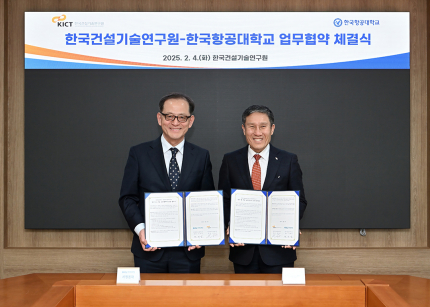
KAU Signs MOU With KICT for Spaceport Construction
Korea Aerospace University (KAU) signed an MOU with the Korea Institute of Civil Engineering and Building Technology (KICT), a government-funded research agency, on Jan. 4 at the KICT headquarters and agreed to collaborate on establishing an aerospace industry ecosystem. The signing ceremony was attended by KAU President Hurr Hee-young, KICT President Park Sun-kyu, and other officials from both institutions. Under this agreement, the two institutions will collaborate on various initiatives, including spaceport construction, mobility solutions for space exploration, and identifying joint R&D projects in the space sector. As their first joint initiative, KAU and KICT will apply for the Global Top Strategic Research support program organized by the Ministry of Science and ICT (MSIT) and the National Research Council of Science & Technology (NST). Since 2016, KICT has been conducting research on space construction, aiming to develop core construction technologies capable of withstanding extreme extraterrestrial environments. It operates the world’s largest dusty thermal vacuum chamber (DTVC). Meanwhile, KAU boasts numerous faculty members with extensive experience in satellite projects and large-scale launch vehicle system development. With these combined strengths, the two institutions anticipate achieving significant research breakthroughs in core space technologies, including spaceport construction and the development of lunar exploration vehicles. KAU President Hurr demonstrated his confidence in the collaboration at the signing ceremony, stating, “KAU is an aerospace university filled with research personnel and professors rich in experiences in satellite and projectile system development, making us stand out from other universities in creating actual research performance, and contributing to fostering field-adaptive talents and carrying out joint technology research.’ He proposed further prospects, adding, “Because both KAU and KICT are both located in Goyang, we will be able to cooperate on Gyeonggi-do’s Regional Innovation System & Education (RISE) and establish Korea’s only cluster dedicated to spaceport construction research, which will assist implementing Goyang’s free economic zone.” KICT President Park echoed these sentiments, saying, “KICT possesses construction material production technology using lunar regolith and the world’s top-tier experiment infrastructure for replicating the Moon’s terrestrial environment. This MOU will be an opportunity to further our technological research aimed at leading space construction, including developments in crewed spaceports and uncrewed construction equipment.
2025-02-11 -
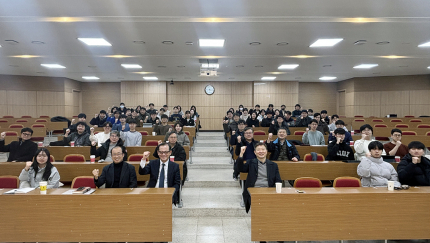
KAU Holds BK21 FOUR Smart Drone Convergence Briefing and Seminar
Korea Aerospace University (KAU) held a project briefing session and exchange seminar on Jan. 15 to share the performance results of its BK21 FOUR (Brain Korea 21 Fostering Outstanding Universities for Research) Smart Drone Convergence program led by Professor Lee Sang-chul. The event kicked off with the congratulatory speech by KAU President Hurr Hee-young, followed by a performance report from Professor Lee Sang-chul, and an award ceremony for outstanding research and students. LIG Nex1 Avionics and Drone Team Lead Song Jun-ho was invited to the event to give a lecture on the status and development of Korea’s defense avionics and drone technology. Participants had the chance to understand the most recent technology trends regarding the convergence program’s research areas, and graduate school students looking to find jobs at LIG Nex1 also received useful employment and startup information. Around 70 participants, including professors and students, attended the event, and they demonstrated enthusiasm throughout the entire schedule. The participants’ attentiveness continued in the Q&A session after the lecture as they asked pertinent field-specific questions. Since its launch in September 2020, the KAU BK21 FOUR Smart Drone Convergence program has been dedicated to cultivating top-tier talent in smart drone technology, fostering professionals who drive innovation beyond traditional boundaries through expertise in core technologies. The program provides participating graduate students with in-depth knowledge of essential foundational technologies while equipping them with hands-on experience in industry–academia–research collaboration, shaping them into well-rounded professionals.
2025-02-11 -
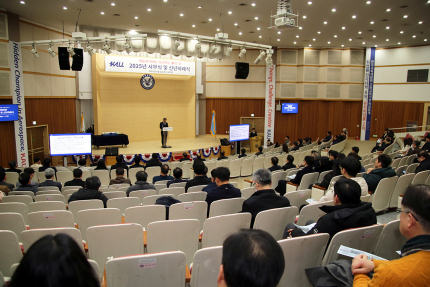
2025 New Year Ceremony: Seeking New Paths in a Transformative Era
The 2025 New Year Ceremony and New Year's Greeting were held at 11 AM on January 2 in the university's main auditorium. This year's ceremony was held in a simplified form, with certain segments omitted, in observance of the national mourning period for the victims of the Jeju Air tragedy. The faculty and staff attending the ceremony wore black ribbon-shaped memorial badges distributed by the university headquarters and held a moment of silence to honor the victims. In his New Year’s address, Korea Aerospace University (KAU) President Hurr Hee-young vowed, “For the sake of change, our university has been running tirelessly. In the new year, we will continue to forge ahead on the path we have been pursuing, aiming to realize the immense potential unique to the Korea Aerospace University.” He further remarked, “With the understanding and cooperation of our faculty, staff, students, alumni, and foundation, we achieved several remarkable accomplishments last year,” and highlighted the following achievements: the completion of a five-year educational infrastructure expansion project, the expansion of major R&D contracts based on industry-academic collaboration, the establishment of the School of Global Aviation Studies, the training of MRO personnel through the Aviation Technical Training Institute, an increase the university’s financial scale by over 20%, and the achievement of an S-rating in the Ministry of Education’s University Innovation Support Project performance evaluation.The key projects for the 2025 academic year were also outlined, including establishing various promotional strategies to enhance the university’s undervalued reputation, such as promoting the Vision 2030 plan to be developed this year, successfully implementing the Self-Directed Major Program and Dream Design College (DDC), which will commence in the 2025 academic year, advancing student welfare projects, such as remodeling the Student u n i o n building and actively supporting DDC programs, expanding internationalization efforts, including increasing the number of majors in the School of Global Aviation Studies to four in the first semester and launching new international education programs in the second semester, and preparing for the Regional Innovation System & Education (RISE) initiative, which will begin in the 2025 academic year. President Hurr Hee-young specifically urged faculty members to actively participate in the RISE initiative and join efforts to engage in government-supported projects. He concluded his New Year’s address by stating, “Korea Aerospace University’s journey of innovation and creative destruction will continue in the new year. With sustained efforts, we will achieve even better results than last year.” Following the ceremony, free tteokguk (rice cake soup) was served to all faculty and staff members at the student cafeteria. ☞ View the President’s New Year Message
2025-01-10 -
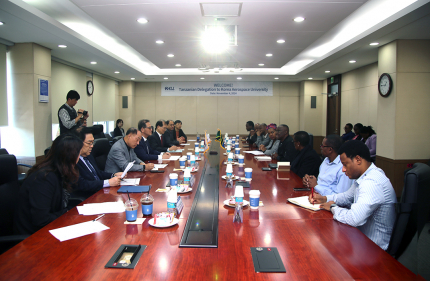
Tanzanian Government Delegation Visits KAU to Establish Aerospace University
A delegation from the Tanzanian government, working to establish the Tanzania Aerospace University, visited Korea Aerospace University (KAU) on Nov. 4, at 1 PM. The delegation, comprising 15 government and private-sector representatives, including the Permanent Secretary of Finance and Planning in the President’s Office, Juma Malik Akil, met with KAU President Hee-young Hurr, along with the university’s deans and distinguished professors, for discussions. The delegation toured campus facilities, including the A300 aircraft, the Aerospace Museum, the simulated air traffic control training room, and various research laboratories.KAU has maintained ongoing cooperation with the Tanzanian government, working together to explore avenues for developing Tanzania’s aviation industry and training aviation professionals. This cooperation has included conferring an honorary doctorate on Tanzanian President Samia Suluhu Hassan when she visited Korea in June to attend the 2024 Korea-Africa Summit. With the recent agreement for Tanzania to receive USD 2.5 billion in concessional loans from Korea’s Economic Development Cooperation Fund (EDCF), discussions between KAU and the Tanzanian government regarding the establishment of the Tanzania Aerospace University have gained remarkable momentum. The delegation’s visit to KAU was also aimed to set goals and directions for the project in preparation for the upcoming discussions on the disbursement plan for concessional loans from the Korean government. President Hurr welcomed the delegation, expressing KAU’s commitment, saying, “We will actively cooperate in fostering the development of Tanzania’s aviation industry and training skilled professionals in a nation with immense potential for aviation industry growth.” He further stated, “I hope this visit will mark the beginning of Tanzania’s full-scale collaboration projects with the Korean government and KAU.” Permanent Secretary Juma Malik Akil responded, “The establishment of the aerospace university is a critical project among the initiatives that our government is pursuing, and the Tanzanian government looks forward to close collaboration with KAU to achieve this goal.”
2024-11-18 -
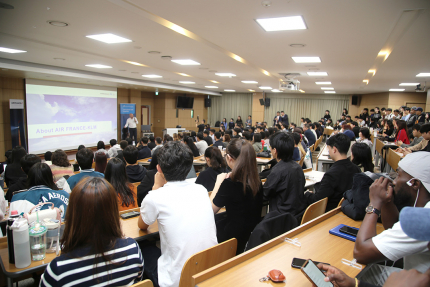
KLM Royal Dutch Airlines’ Lecture and Event Inspire Future Aviation Talents
On Oct. 30, KLM Royal Dutch Airlines (KLM) hosted a special event and lecture in Korea Aerospace University’s (KAU) lecture hall to commemorate its 40th anniversary of service to Korea. As part of a series of events celebrating the 40th anniversary of its direct route to Korea on Oct. 31, KLM visited KAU to personally encourage future aviation professionals, while holding various events for Korean customers.The event featured Boris Darceaux, Regional President for Korea, Japan, and New Caledonia, and Moon-jung Lee, President of Air France-KLM Korea, who spent the afternoon with students, engaging in discussions about the present and future of the aviation industry with their Air France-KLM Korea colleagues. Lee Dong-myung, KAU’s Dean of the College of Aviation & Management, and Park Jin-woo, Dean of the School of Open Major and Global Aviation Studies, along with faculty from the Department of Aviation Management and the School of Open Major and Global Aviation Studies, extended a warm welcome to the Air France-KLM representatives. Over 200 students, including those from the Department of Aviation Management, participated in the event. During a special lecture titled Last 40 Years and Next 40 Years of KLM in Korea, Darceaux presented Air France-KLM’s vision and achievements in the Korean market, sharing experiences and insights as a leader of a global airline with KAU students, who are set to become the future leaders of the aviation industry. The students filled the hall with barely any space and remained engaged during the Q&A session, asking the Air France-KLM team profound questions about the future of the global aviation industry and their individual career paths. “Thanks to this event, I now have a clearer understanding of how to prepare for a career towards a global airline,” commented one participating student, expressing the hope for more similar opportunities in the future.After the lecture, Air France-KLM hosted a special event in the outdoor area in front of the lecture hall. Celebrating 40 years of service to Korea, Air France-KLM provided a coffee truck, offering students a refreshing break on campus. In particular, Air France-KLM, which operates the Sustainable Aviation Fuel (SAF) Program to promote eco-friendly flights, provided free coffee to students who brought personal tumblers, encouraging environmental awareness and sustainability practices in daily life.Faculty members from the Department of Aviation Management, who co-hosted the event with Air France-KLM, stated, “It was a meaningful day to host a joint event with Air France-KLM, a global airline connecting Korea and Europe, on behalf of Korea’s aviation universities.” They added, “We will continue to offer diverse opportunities for students to grow into global talents who will lead the future aviation industry.”
2024-11-18 -
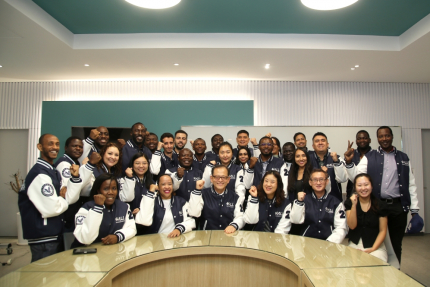
Ceremony to Present School Jumpers to Students in ICAO Fellowship Program on Global Aviation Policy
On the morning of Oct. 16, the Korea Aerospace University (KAU) held a ceremony at the school’s Space Lounge to present school jumpers to the students participating in the ICAO Fellowship Program on Global Aviation Policy.This program is a newly launched master’s degree course for aviation officials from developing countries, organized by KAU with the support of the Ministry of Land, Infrastructure and Transport. The trainees will spend one and a half years at KAU, gaining specialized knowledge and practical skills in the aviation field. On the day of the event, KAU President Hee-young Hurr, Dean of the Office of International Affairs Woon-kyung Song, Program Director Professor Jin-ki Kim, and other members of the faculty and staff warmly welcomed the twenty-five trainees from 24 developing countries, including Tanzania, Rwanda, and Mongolia, encouraging them as they embark on their studies in a foreign state far from their homelands. The ceremony began with trainee representatives personally presenting President Hurr with a school jumper, featuring the university logo and the ICAO program name. In return, the president dressed the representatives in their school jumpers, earning applause from the attendees. President Hurr stated, “ICAO Fellowship Program on Global Aviation Policy has garnered significant attention from the Korean government, including the Ministry of Land, Infrastructure and Transport. The program’s schedule will surely be demanding, but this experience will broaden your perspectives and assist you as you build your global network.” He further encouraged the trainees to continue playing crucial roles in maintaining and fostering relationships with their respective governments, as each one of them are recognized experts representing their countries in aviation. All faculty members and school staff at the event pledged their full support to ensure the success of the trainees throughout the program. The trainees, in turn, expressed their gratitude to President Hurr and the university for their enthusiastic support and vowed to push ahead with their best efforts in the upcoming training program
2024-10-22 -
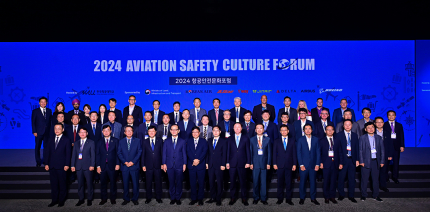
KAU Holds “2024 Aviation Safety Culture Forum” With MOLIT and Airlines In and Out of Korea
On Sep. 25, the Korea Aerospace University (KAU) held the 2024 Aviation Safety Culture Forum at the Grand Hyatt Incheon. Hosted by KAU and sponsored by the Ministry of Land, Infrastructure and Transport (MOLIT), Korean Air, Jeju Air, T’way Air, Jin Air, Delta Air Lines, Airbus SE, and Boeing, the forum was held under the theme of establishing a culture for aviation safety. The event aimed to improve aviation safety and lay the foundation for fairness in the Republic of Korea through cooperation between industry entities, government organizations, and academic parties. The forum was attended by over 230 participants from 11 domestic airlines, including Korean Air, as well as aviation-related government agencies and academia from within and abroad. Significant stakeholders in the global aviation industry, such as Delta Air Lines, Hawaiian Airlines, Airbus SE, and Boeing, also participated. In his opening remarks, President Hee-young Hurr said, “This forum, which brings together industry, government, and academia representing Korea’s aviation sector, will serve as an opportunity to further strengthen the safety of Korea’s aviation industry, which is recovering rapidly post-COVID-19. I believe this forum aligns with the mission of KAU, the nation’s only comprehensive university for aerospace.” President Hurr’s remarks were followed by a welcoming speech from Jong-wan Joo, Deputy Minister of Korea Office of Civil Aviation (KOCA). He emphasized, “The signing of the ‘Aviation Safety Culture Leadership Charter’ by domestic airlines at today’s forum signifies a strong commitment to spreading safety awareness throughout the aviation industry. The government will also support aviation safety by continuing to provide policy support.” On the same day, 11 domestic airlines, including Korean Air, along with our university, announced the “Aviation Safety Culture Leadership Charter.” Korean Air CEO Kee-hong Woo and President Hurr personally signed the charter, which consists of five resolutions: 1. Make [L1] aviation safety the top management priority and do one’s best to deliver this value to customers. 2. Recognize the gravity of building a positive safety culture and affirm leadership’s commitment to safety. 3. Consistently strive to improve safety culture and create an environment where all aviation personnel are treated fairly and clearly understand acceptable and unacceptable behavior. 4. Foster a trustworthy environment for active exchanges of information and reports without fear of retaliation; and equip employees with the knowledge and competencies needed for safe operations. 5. Flexibly respond to changing environments and foster a culture of sharing and spreading safety information. A discussion was held in Session 1, chaired by Professor Ho-won Hwang from KAU’s Department of Air Transportation and Logistics, with panels including Professor Jang-ryong Lee from KAU’s Department of Aeronautical Science and Flight Operations, addressing the current state of aviation safety culture in Korea and exploring potential improvement measures. Session 2 was chaired by Bennett Walsh, the Senior Vice President of Korean Air, focusing on various case studies of aviation safety culture. Session 3 featured a panel discussion exploring the directions for improving aviation safety, moderated by Professor Yeon-cheol Choi from Hanseo University, with presentations by Professor In-gi Na from KAU’s Global Aviation Studies. A Korean Air representative at the forum stated, “We will establish a proactive safety management paradigm based on safety culture partnerships and secure a leading position in the global aviation industry by solidifying aviation safety.” [L1]원문에서는 △표시로 작성되어있던 부분이나, 영어에서는 해당표시를 사용하지 않아 대신 넘버링으로 처리하였습니다. 확인부탁드립니다.
2024-10-14 -
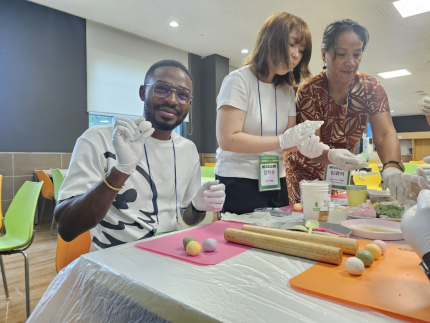
KAU's Social Dining for Global Exchange with the Goyang Council for Sustainable Development
Korea Aerospace University (KAU) organized a social dining event on September 12 at Eunik Hall with the Goyang Council for Sustainable Development's Sustainable Society Committee. The event was held for participants of the ICAO Global Aviation Policy Fellowship. Attendees from diverse cultural backgrounds came together to share a meaningful meal, fostering cultural exchange and understanding.◌ Social dining, a platform for building connections and cultural exchangesSocial dining is an activity that fosters communication and interaction over a shared meal, serving as a vital means of enhancing social engagement and promoting cultural exchange beyond the act of eating. This event embraced the concept of social dining, bringing together 25 ICAO Fellowship participants and five Korean KAU students. They discussed various topics while sharing their cultures and personal experiences.In his welcoming speech, a representative from the Goyang Council for Sustainable Development likened social dining to “two wings that connect lives through food and conversation,” explaining that one wing represents "cooking" and the other "talking." He highlighted how the event would expand participants' social networks and offer a meaningful experience. Originally launched as a program for individuals living alone during the COVID-19 pandemic, the initiative has since evolved into a cultural dining experience for international students. Since last year, it has been regularly held for international students at universities in Goyang.◌ Making songpyeon and baramtteok, a traditional Korean food experienceA highlight of this social dining event was the hands-on activity where participants crafted their own songpyeon and baramtteok rice cakes. Organized in celebration of Chuseok, Korea's signature holiday, this program allowed attendees to engage with traditional Korean cuisine firsthand. Songpyeon, an iconic dish for Chuseok, was personalized by participants who kneaded rice cake base and added fillings.Baramtteok, another beloved Korean rice cake, was made collaboratively, deepening participants' understanding of Korean culture and culinary traditions. Throughout the process, Korean students shared the significance and customs surrounding songpyeon and baramtteok, fostering a space for cultural exchange through food. . This activity offered more than just a culinary experience; it provided participants with the chance to bond and appreciate cultural diversity◌ Time of conversation, sharing global stories of Chuseok and the holiday seasonAn integral part of the event was time set aside for conversation, where participants from various countries shared their stories about Chuseok, introduced their own festivals, and explored each other's cultures. Discussions included the origins and significance of Chuseok, as well as insights into Korea's family-oriented culture and traditions. Participants exchanged details about their own holiday customs and special foods, fostering a rich space for cultural exchange.In particular, ICAO Fellowship participants recounted how they celebrate holidays, traditional foods, and family gatherings in their home countries, highlighting both differences and commonalities. This conversation provided a meaningful moment for participants to grasp the true essence of social dining, as they listened to each other’s stories rather than merely enjoying the meal. This event not only offered international students at KAU a chance to experience Korean holidays and traditional cuisine, but also exemplified efforts to strengthen social ties and respect cultural diversity as part of the Goyang Council for Sustainable Development's commitment to building a sustainable society.
2024-09-20 -
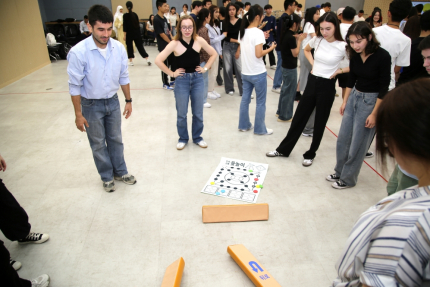
KAU's Chuseok Holiday Festival with International Students
Korea Aerospace University (KAU) held a holiday festival for international students on September 11 at Vision Hall ahead of the Chuseok holiday. Over 100 international students from countries such as China, Uzbekistan, and Mongolia gathered to experience Korean holiday traditions. The event aimed to introduce the significance and customs of Chuseok to students unfamiliar with Korean holidays, enhancing their interest in and understanding of Korean culture. In attendance were key faculty members, including Dean Lee Dong-myung of the College of Aviation and Management, Director Song Woon-kyung of the Office of International Affairs, Dean Park Jin-woo of the School of Global Aviation Studies, and Chair Professor Lee Jin-sang, who encouraged the students throughout the event. Faculty members demonstrated traditional Korean games like jegichagi and biseokchigi, providing students with an opportunity to engage in these cultural experiences.The students were divided into teams to play traditional games, such as tuho, yut-nori, and more. For lunch, participants enjoyed a variety of traditional Korean dishes, including bibimbap, songpyeon, and sikhye. “We hope that international students unable to return home for Chuseok could feel the warmth of Korea through this event,” said a representative from KAU International Exchange Team, adding that they plan to continue offering opportunities for international students to explore different aspects of Korean culture.
2024-09-20 -
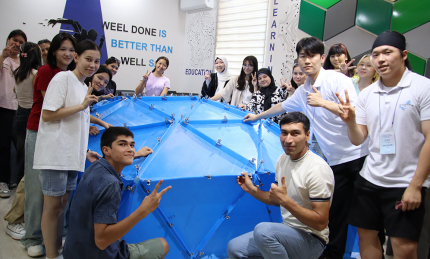
2024 KAU International Academic Exchange Program For Academic and Cultural Exchanges With TSTU Students
Korea Aerospace University (KAU) is holding the 2024 KAU International Academic Exchange Program in Uzbekistan with KAU students engaging in summer volunteering activities from July 22 to August 1 The volunteer group built friendships with local students, sharing educational programs based on aerospace knowledge and Korean culture.This year, a group of fifteen volunteers, including thirteen attending students and two school staff members, visited Tashkent State Transport University (TSTU) and the local Korean Education Center to conduct four programs: ground paragliding training, DIY drone race, creating supersized planetariums, and Korean food experience. “I heard paragliding was rare in Uzbekistan due to the low winds and flat terrain, so I prepared the equipment in advance from Korea. I felt my work was worthwhile thanks to the joy it brought to the Uzbek students,” said Kim Do-ha (Dept. of Aerospace Electronics and Information Engineering; enrolled in 2021), who participated in the paragliding experience volunteer program.Local students also showed great interest in other programs, including autonomous flight drills with hand-made drones and the Korean food experience, where they cooked and shared tteokbokki and rice balls.After completing the academic exchange program, the volunteer group visited Uzbekistan’s most notable tourist sites, such as Samarkand and Bukhara, before returning safely to Korea. The group leader Cho Eun-jae (Dept. of Aeronautical Science & Flight Operation; enrolled in 2019) commented, “We were thrilled to see local students show their love for Korea and enthusiastically participate in our programs. I am grateful for my fellow members who gave their everything despite the hot weather, local students who greeted us with sincere hearts, and officials of both universities who gave us this priceless opportunity.”
2024-08-20 -
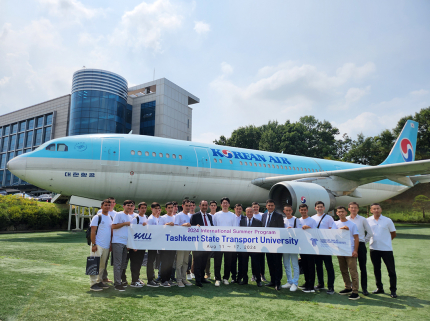
KAU's International Summer Program With TSTU, Accompanied by Vice Rector’s Visit
Korea Aerospace University (KAU) will operate the International Summer Program (ISP) for the staff and students of Tashkent State Transport University (TSTU) in Uzbekistan from August 11 to 17. Five members of TSTU delegation, including Vice Rector Omonov Otajon Juraqulovich, and eighteen TSTU students majoring in aviation transportation will attend this year's ISP. Vice Rector Juraqulovich and his delegation initiated their official schedule by meeting and receiving the welcoming ceremony of KAU President Hurr Hee-young and his fellow staff. “As this session will be KAU's first IPS with TSTU, our staff are very excited as well,” stated President Hurr as he greeted the TSTU delegation. He added, “We promise to do our best in operations to ensure this program benefits the professors and students who have traveled from afar and becomes an exemplary case for international cooperation between our institutions.” Chair Professor Hong Nam-gi commented, “I have always been interested in advancing the economic cooperation between Korea and Uzbekistan, which is why I am thrilled to see our university build a close relationship with TSTU,” adding, “I hope you use this ISP to your advantage and enjoy Korean culture as well as learning as much as you can.” Chair Professor Lee Jin-sang, who will oversee the ISP, along with Director Song Woon-gyeong of the International Exchange Office, Director Hwang Wan-sik of the Student Affairs Office, and Director Kim In-gyu of the Flight Training Center, also welcomed the members of TSTU. TSTU is a national university located in Tashkent, Uzbekistan’s capital, which focuses on areas related to aerospace and transportation. TSTU signed its first memorandum of understanding with KAU during the March visit of the Uzbekistani President’s Office’s Aerospace Cooperation Group and agreed to cooperate on various agendas, including academic research and staff and student exchanges. The two schools have since established their close relationship, as the KAU Summer International Volunteer Group, consisting of KAU students, personally visited TSTU since last year’s summer vacation to offer educational volunteering services on knowledge regarding drones, rockets, and other similar areas. Vice Rector Juraqulovich showed his gratitude for the warm hospitality received from our university since the previous day, stating, “KAU is the most prominent institution in Uzbekistan’s international aviation cooperation, with high interest from the Uzbek Ministry of Education and Ministry of Transport in our collaborative projects.” He added, “I hope for increased academic exchanges between KAU and TSTU and wish to gather as much necessary information as possible during this visit.” President Hurr acknowledged his gratitude, responding, “We will spare no effort in sharing the capabilities our university has accumulated for 70 years in Korea’s private aerospace fields.” TSUT faculty, staff, and students will take special courses prepared by KAU during the week-long ISP period. These courses will be accompanied by on-site field trip programs, during which they will tour the Incheon International Airport and Korean Airlines’ facilities and experience Korean culture by visiting attractions such as Wolmi Island and Nami Island. During the program, TSTU staff will meet with the KAU International Exchange Office to discuss matters related to the joint diploma course, which is being implemented as a collaboration between the two schools.
2024-08-20 -
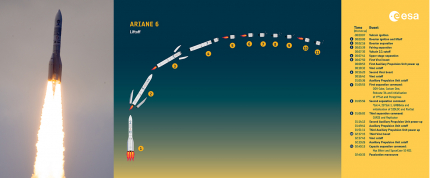
OOV-Cube Developed by Professor Zizung Yoon Finds Climactic Success After Launch
OOV-CUBE, a nanosatellite developed by Korea Aerospace University (KAU) Professor Zizung Yoon (Dept. of Smart Drone Engineering) succeeded its first transmission after six days of launch via Ariane 6, a rocket of the European Space Agency (ESA). On July 9 at 4 PM (local time; July 10 at 4 AM KST), OOV-CUBE was launched into space at the Guiana Space Centre in Kourou, French Guiana, loaded onto the Ariane 6, Europe’s next-generation launch vehicle. Ariane 6, a new rocket that the ESA showcased as an ambitious project after 28 years, included NASA’s nanosatellite and nine other satellites as well as OOV-Cube. The satellites successfully separated themselves from the top of the projectile one hour and six minutes after launch and entered the target orbit. However, the research team had to anxiously wait as they took a few more days to return their transmissions to Earth. The reason was that batteries inside the satellites became discharged due to the delay in the launch of Ariane 6, which prevented them from operating immediately after stabilizing their orbit, taking several more days to recharge in orbit using their solar cells. OOV-Cube, a cube-shaped satellite, required even more time to recharge as it had a relatively smaller solar panel area. Despite the difficulties, the satellite finally returned its first transmission with the Technical University of Berlin (TU Berlin) ground station on July 15 at 6 PM (local time; July 16 at 1 AM KST), delivering the news of its successful operation. Professor Yoon and the research team plan to run a detailed checkup on the satellite’s status for a week or two and carry out its mission of examining advanced technologies in space. This includes demonstrating a highly efficient communication protocol where the ground IoT device communicates directly with the satellite and a data processing assessment through the AI neural network e x e cuted within the satellite’s onboard computer. The accomplishment of OOV-Cube’s mission is expected to solidify Korea’s position in the European space market by verifying the nanosatellite platform technology that harnesses high reliability at a low cost and expand the opportunities to carry out additional technology examination missions in the future. Also, the team has prospects of demonstrating the core technology required for IoT services, the elements that will play a crucial role in the 6G telecommunications market, which will bring the convergence of ground and satellite communications, as well as enabling environment monitoring by connecting countless mobile IoT devices and the satellite constellation by demonstrating ultra-low-power IoT communication technology. The satellite control centers at KAU and TU Berlin will be responsible for the satellite’s operations. As a head researcher at TU Berlin, Professor Yoon developed and designed “TUBiX10,” the satellite platform utilized by OOV-CUBE. From 2018 to 2020, five satellites were created using the TUBiX10 platform to successfully operate in a low-orbit environment. OOV-CUBE took the honor of winning the contest in 2022 hosted by the ESA before the first flight of its new projectile Ariane 6, and thus earned the opportunity to verify its advanced technology in space without any launching costs. Professor Yoon stated, “There were risks, as succeeding in the first launch of a satellite is far from easy. However, I put myself to the challenge because I was confident I could develop and produce the satellite faster and more efficiently. I am grateful to the ESA for allowing me to launch the satellite and the Korea Aerospace University for establishing the satellite’s ground station within the school area as a part of the Convergence and Open Sharing System’s next-generation communication program. I will focus on the international cooperation in aerospace areas between KAU and European parties.” Based on OOV-Cube’s achievement, Professor Yoon plans to push forward in his development of the IoT technology-loaded constellation satellite.
2024-07-25 -
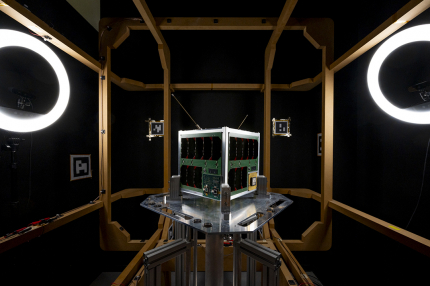
Professor Zizung Yoon’s Nanosatellite “OOV-CUBE,” Set for Launch On Jul. 9
OOV-CUBE, the nanosatellite developed by Zizung Yoon, a professor at Korea Aerospace University’s Department of Smart Drone Engineering, will be launched on July 9. OOV-CUBE is currently loaded on Ariane 6, the new projectile stationed at the Guiana Space Centre, which is the launching grounds of the European Space Agency (ESA). The critical mission of the nanosatellite is to verify advanced technologies, such as AI and IoT, in a space environment to enhance their technology readiness level (TRL); “OOV” from this satellite’s name is also the abbreviation of “On-Orbit Verification.” The advanced technologies OOV-CUBE will verify on this mission include highly efficient IoT protocol receivers, next-generation Perovskite solar cell experiments, a highly efficient AI processor and onboard cloud detection neural networks, L-band transceivers for stationary inter-satellite communication on low orbit, and two optical cameras. In particular, the plan is to secure a competitive edge in advanced technology by demonstrating the IoT technology that allows miniature IoT devices to communicate directly with the satellite and verifying the AI technology on the nanosatellite. As a head researcher at the Technical University of Berlin (TU Berlin), Professor Zizung Yoon developed and designed “TUBiX10,” the satellite platform utilized by OOV-CUBE. From 2018 to 2020, five satellites were developed using the TUBiX10 platform to successfully operate in a low-orbit environment. TU Berlin and Rapid Cubes, a nanosatellite company, were responsible for the production and testing of this mission. OOV-CUBE took the honor of winning the contest hosted by ESA before the first flight of its new projectile, Ariane 6, and thus earned the opportunity to verify its advanced technology in space without any launching costs. The first launch of Ariane 6 will include 15 projectiles developed in European countries and the OOV-CUBE satellite. After the satellite’s successful launch on the 9th, it will be under operation by two satellite control centers, the Korea Aerospace University’s Distributed Space Systems Research Lab and TU Berlin. The Korea Aerospace University also newly established a satellite control center within the campus as a part of its Innovative & Convergent University Project for Next-Generation Communication. Professor Yoon commented, “This mission will be a chance for us to accumulate technology and experience in the high-tech field, including IoT communication and AI utilization in space by harnessing nanosatellites.” He added, “I look forward to our university students building relevant on-site expertise as they participate in the satellite’s operation.”
2024-07-04 -
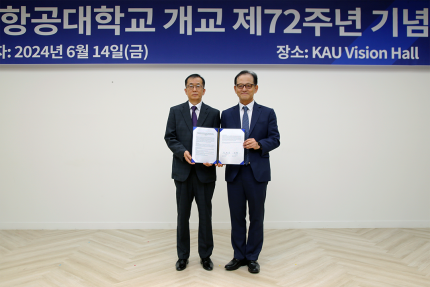
KAU and CAE Korea Sign an MOU to Nurture Future Aviation Talents
On June 14, Korea Aerospace University (KAU) and CAE Korea concluded an MOU to nurture future aviation talents. CAE (Canadian Aviation Electronics) is a leading flight training simulator manufacturer and training company headquartered in Canada. With operations in 35 countries, including Korea, CAE is a global industry leader that accounts for over 70% of the world's airline training simulator production. Through this MOU, KAU and CAE Korea have agreed to mutually cooperate in the development of the aerospace industry as well as its talents. This includes operating CAE Korea's flight simulator experience course for students in the Department of Aeronautical Science & Flight Operation, implementing a system to train new pilots in Korea, and developing future aeromobility training courses and qualification systems.The signing ceremony was attended by Hurr Hee-young, President of KAU; Lee Jae-wook, Vice President of Planning; Lee Jang-ryong, Chair of the Department of Aeronautical Science & Flight Operation; Yoo Byung-sun, Professor in the Department of Aeronautical Science & Flight Operation; Kim In-kyu, Director of the Flight Training Center; and officials from from CAE Korea, including General Manager Eom Young-joon and Director Kim Jun-min. “I hope that the two organizations will work together to maintain Korea's aviation manpower training system at the highest level in the world,” said Eom Young-joon, General Manager of CAE Korea and an alumnus (Class of 1979) of the School of Aerospace and Mechanical Engineering. President Hurr expressed his gratitude for the partnership, stating, “We are grateful to have signed an MOU with CAE, a world-class company in aviation pilot training, to improve the quality of flight training for our students. I hope that both institutions will actively interact in the future to cultivate future aviation mobility professionals.” During the 72nd anniversary of the university's opening ceremony, KAU honored General Director Eom with the Industry-Academia Cooperation Award. Moving forward, both institutions have committed to fostering ongoing exchanges through student lectures and colloquiums.
2024-06-19 -
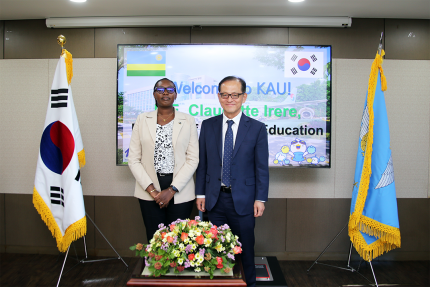
Rwandan Minister of Education Visits to Benchmark for the Establishment of Aviation University
Minister of Education Claudette Irere of Rwanda visited Korea Aerospace University at 3 pm on June 4. Minister Irere, visiting Korea with the President of Rwanda for the "2024 Korea-Africa Summit," is visiting major universities in the country including our university to promote partnerships between the two countries' higher education institutions. Her visit to KAU aimed to discuss exchange and cooperation plans related to the Aviation Academy scheduled to be established in Rwanda this year. At the university, President Hee-Young Hurr of Korea Aerospace University along with other officials welcomed Minister Irere. President Hurr gave Minister Irere a tour of the university's main facilities, including the A300 exhibition aircraft, pilot training room, and air traffic control simulation room. Minister Irere also attended the "AIRBUS 101" event jointly organized by the university and global aircraft manufacturer AIRBUS, where she delivered a brief speech. As a small landlocked country in Africa, Rwanda has been rebuilding itself from the civil war in the 2000s. Following the examples of countries like South Korea and Singapore, it has achieved stability in a short period of time through economic growth. Despite its lack of natural resources, Rwanda has significant growth potential with 70 percent of its 14 million population below 35 years. The country aims to become the business hub of Africa by improving infrastructure particularly air transportation, leveraging its central geographical location on the continent. In discussing her country's situation, Minister Irere emphasized the urgent need to develop skills and train professionals across the entire aviation industry value chain for Rwanda's growth. To address this, Rwanda is establishing an aviation university to train pilots, air traffic controllers, and mechanics, with the construction of the campus set to begin this year. Minister Irere expressed her desire to partner with KAU, seeking close collaboration throughout the establishment and operation of the aviation university, and to benchmark KAU's curriculum. President Hurr expressed deep understanding of Minister Irere's objectives and committed to active cooperation with the university in the future. Minister Irere and KAU officials agreed to expand human exchanges with Rwanda gradually, beginning with the acceptance of Rwandan students into Korea's Fellowship Programme on Global Aviation Policy. Supported by the Ministry of Land, Infrastructure, and Transport, this program will be implemented for the first time in August this year. It also offers a master's degree in aviation for government officials from developing countries. Moreover, they agreed to develop detailed plans for exchange and cooperation further, including the establishment of the aviation university. As an aerospace university, KAU joined ALICANTO, an international aerospace education organization established by ICAO in 2023, to facilitate exchanges with other aerospace universities worldwide. Since 2020, KAU has been operating a master's degree training program for aviation practitioners and managers from developing countries like Rwanda and Tanzania through an agreement with KOICA (Korea International Cooperation Agency). The university boasts of three flight training centers in Korea and one in Florida, USA, and it is actively collaborating with developing countries including Uzbekistan to cultivate global aviation talent.
2024-06-11 -
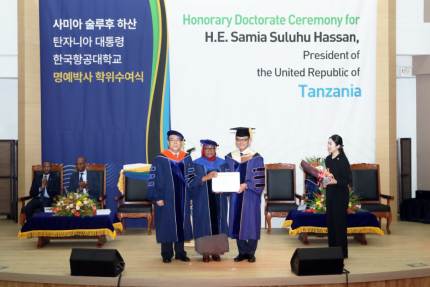
KAU Grants Honorary Doctorate Degree to Samia Suluhu Hassan, President of Tanzania
The (Korea Aerospace University (KAU) granted an honorary doctorate degree in aerospace management to Samia Suluhu Hassan, the president and first female state leader of Tanzania. The event took place on the 3rd at 2 PM in the auditorium of KAU. President Hassan chose KAU as the first location on her schedule after her official visit to Korea to participate in the “Korea-Arica Summit 2024,” held from 4 to 5 June. Inaugurated in 2021, President Hassan brought peace into neighboring nations as well as her own through spectacular leadership and influence, drawing praise that she contributed to Tanzania’s transformation into the leading state of peace and democracy in Africa. In 2014, she led Tanzania’s democratic movements as the vice chairperson of the constitutional parliament that prepared the country’s new constitution. In 2022, she organized the COVID Measures Commission amid the epidemic, disclosing the nation’s crisis response status to the public and cooperating with the international community. Her efforts received worldwide acknowledgment, leading the USA Times to s e l e c ther as one of the “Times 100: Most Influential People in 2022.” Marking its 32nd anniversary of diplomatic relations with Korea, the Tanzanian government seeks to actively scale its attraction of foreign investment and official development aid (ODA) according to its initiative, “Tanzania Development Vision 2025.” In particular, President Hassan strove to establish close ties with Korea, indicating the peninsular state in East Asia as Tanzania’s role model and sharing the country’s development experiences related to infrastructure related to the aerospace industry, ICT, and education. To honor her achievements and contribute to the cooperative relationship between the two countries, KAU decided to confer President Hassan an honorary doctorate degree in aerospace management. “We decided to grant our university’s honorary doctorate degree to President Samia Suluhu Hassan, who displayed outstanding leadership and vision for the prosperity of the international community,” said KAU President Hee-Young Hurr during his welcoming remarks. He added, “Through our collaboration with Tanzania, the nation with unprecedented potential in aerospace areas, I believe KAU will become the country’s partner that contributes to the development of airports and aviation industries across Africa as well as Tanzania.” Jeong-Taek Hyeon, the chairperson of the Jeongseok Inha Educational Institute, also stressed, “President Hassan’s vision and contribution in realizing Tanzania’s economic growth coincides perfectly with KAU’s mission,” adding, “We hope our honorary doctorate degree becomes a steppingstone to Tanzania’s aerospace education for the development of relevant industries.”
2024-06-04 -
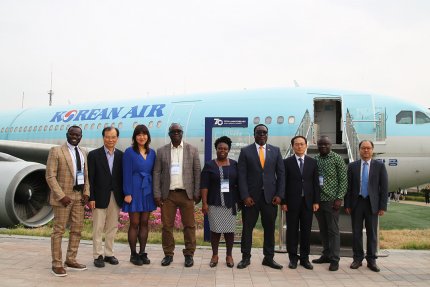
University of Ghana Professors Visit KAU
Professors at the University of Ghana (UoG), a national university of Ghana, visited Korea Aerospace University on April 30. Five professors including University of Ghana Centre for Asian Studies Director Lloyd G. Adu Amoah visited Korea from April 21 to May 4 to attend the Capacity Building Program for the University of Ghana Officials hosted by the Korea International Cooperation Agency (KOICA). During their stay in Korea, they visited KAU as well. Dean Lee Dong-myeong of the KAU College of Aviation & Management, Aviation & Management Professor Yi Jin-sang, Planning Bureau Director Yi Jae-uk, and International Exchange Bureau Director Song Un-gyeong discussed the KAU-UoG exchange with UoG professors. The University of Ghana is the largest public university among the 13 public universities in Ghana. Approximately 40,000 students are currently studying at UoG. The University of Ghana consists of the College of Health Sciences, College of Basic and Applied Sciences, College of Humanities, and College of Education. At the time of its opening in 1948, the University of Ghana used to be called “University College of the Gold Coast” since Ghana was a British colony. After Ghana gained independence, the school was renamed University of Ghana in 1961. UoG professors, mostly computer engineers, discussed with KAU the ICT Innovation Center to be constructed in Ghana and benchmarked the relevant technologies. UoG professors decided to visit KAU based on their relationship with KAU Professor Yi Jin-sang who specializes in African studies. “Numerous Middle Eastern and African countries are recently proposing cooperation to us since not only are we teaching and researching advanced fields such as drones, satellites, and national defense; we are also cultivating traditional aviation experts such as pilots, controllers, and MRO experts. I am sure that Korea Aerospace University and University of Ghana can create synergy together,” Professor Yi Jin-sang said. UoG Asian Studies Director Lloyd Amoah expressed hope that they can conclude an agreement with KAU and start student and faculty exchange and joint researches in aviation technology as soon as possible. "It will be great if we keep expanding mutual exchange programs together,” he added.
2024-05-28





